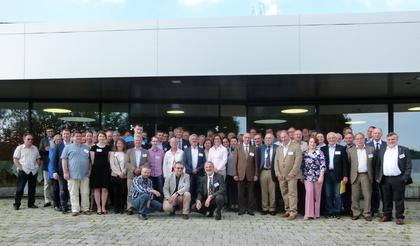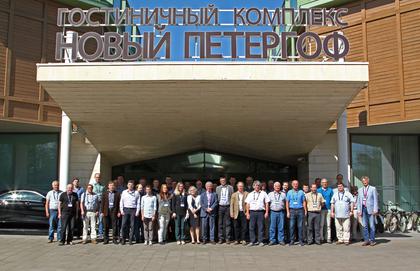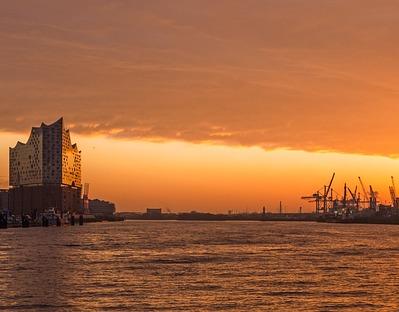Work Package 8
Communication and dissemination; innovation; education & training
Work Package Lead: Ekaterina Kolesnikova
Kolesnikova_EA@nrcki.ru
NRC “Kurchatov Institute”, Moscow (Russia)
European partner: DESY, Hamburg (Germany)
Other partners: European Spallation Source, Lund (Sweden); Institute Laue-Langevin, Grenoble (France)
Objectives:
- Communication & Dissemination:
- To increase knowledge about the Russian megascience facilities and access opportunities in the EU as well as the awareness and visibility of the potential impact of enhanced co-operation between Russian and European RIs within the public and politics sphere and within the scientific community.
- To establish communication platforms and channels for disseminating outcomes and results of the project.
- Innovation: To identify innovation potentials and industry collaboration possibilities for the megascience projects, including industrial users, technology transfer and links to the regional innovation system around the megascience facilities;
- Education & Training: To identify the need and develop initial support actions for the human capital build-up in the context of the megascience facilities
- To survey existing thematic summer schools in Europe and organize special sessions at three RACIRI Summer Schools on “Advanced Materials Design at X-ray and Neutron Facilities” with megascience content
- To exploit best practice from the previous EU-project RAMIRI (“Realising and Managing Research Infrastructures”; 2008-2010) and RAMIRI2 as well as establishing cross links to its successor under INFRASUPP-3-2014 and devise an own training course adapted to the megascience projects’ needs
Task 8.1.: Project website and links to other relevant portals including targeted social media activities. Lead Partner: NRC KI, DESY
To reach the common goal of a successful project implementation, it is firstly necessary to guarantee a coordinated knowledge management within the project consortium. The latter must thus secondly raise public awareness by spreading project related information not only to a specialized audience of experts but also to young ambitious professionals as well as to all other interested target groups, like e.g. the industry.
Therefore this work package aims at:
- Channeling the information flow and managing knowledge within the project consortium.
- Raising relevant target group´s awareness of the project’s results.
- Linking the project results to other EU-Russian S&T activities as well as to related RI activities in other partner regions of the EU, to establish an exchange platform of project outcomes to both avoid duplication of efforts and reach possible synergies which can result in further common projects.
Project website: A new project website at the domain http://www.cremlin.eu will be launched. Before the launch, a concept will be agreed upon among the consortium members. It will contain information about the layout of the website, the creation of a logo for the project as a sign for common identification and the content which should be available to the public.
The website will give general information on the project, its current activities and events, its objectives and results as well as on the consortium partners. Also, the website will provide a forum which can be used for discussions, question and answer sections, and as a bottom-up initiative to elaborate further needs to establish common research actions.
The website will also serve as an internal communication tool for the project consortium what will be realised via an intranet section.
A constant control and update is planned. The website will be maintained and available online after the end of the project without further up-dating. By doing so, it will serve as a platform to the project’s results in written form.
Linking the project website to other relevant portals: To embed the megascience projects in the context of the EU-Russia S&T relations, the website will not only focus on the project, but it will also highlight current developments in the field of EU-Russian STI relations by linking the website to other relevant portals. Funded by the EC, the existing bilingual web-portal S&T Gate RUS.EU (http://www.st-gaterus.eu/) presents relevant information on the Russian STI landscape, on various aspects of EU-Russian STI cooperation, on cooperation and funding opportunities. Moreover and again funded by the EC, the web-portal incrEAST (see http://www.increast.eu/), a meta-platform designed to inform about STI cooperation opportunities between the EU and Russia as well as the Eastern European, Central Asian and South-Caucasian countries, will be linked to the project website.
Dissemination measures:
-Social Media: A Facebook-account (respectively an account in the Russian vkontakte.ru) will be created to reach out into the desired target groups in a most cost and time efficient way. Moreover, communication through social networks signifies instant and direct interaction between the parties involved (comments, remarks, feedback), beyond one-way information sharing. The facebook (vkontakte.ru) page will be continuously filled with relevant news. It will also react on incoming postings and serve as a cleaning post.
- External Newsletter: To inform at regular intervals about main developments in the megascience projects and their cooperation with EU organizations, an electronic information letter will be published (6x). All project partners will contribute based on the activities in the different WPs. In addition, all partners will be using their own distribution channels to further distribute the information letter at national level.
This task will be subcontracted.
Task 8.2.: Wider dissemination strategy: journalists’ trip to selected Russian megascience facilities and trailer/film. Lead partner: ILL
Building among others on the dissemination channels of Task 8.1., the project will develop a concept for a public relations strategy in order to show the attractiveness of the project and especially its economic importance.
Organization of science journalists’ trip
One measure to promote the projects’ strength is to organize a journalists’ trip to selected Russian megascience Facilities (M18). Well selected journalists from renowned international science journals will be invited to join a delegation to two of the megascience facilities: the ones in Gatchina (PIK) and those in Dubna (JINR). Beforehand the journalists will be briefed with facility-related information so that they will be able to prepare their journey in a proper and professional way (concept of the trip). Their articles will be published after their trip. Accordingly the articles should not be published only in their respective science journals but also via the different dissemination tools mentioned in Task 8.1. A strong cooperation with journalists from the Expert magazine in Russia is planned.
To better support the dissemination efforts of the project a filmmaker will be invited to join the journalists’ trip to the megascience facilities. His task will be to produce a short (not more than 5-7 min.) promotion film which will be centrally placed as an eye-catcher at the starting page of the project website. The goal of this film is to introduce briefly the megascience project in general and to highlight the outstanding scientific excellence of the facilities with their specific features. Above that the film could promote attractive employment possibilities by showing best practice examples of young professionals (to be interviewed) and European scientist working at the facilities and talking about their experience. The concrete content is to be discussed with all consortium members and Russian authorities.
This task will be subcontracted to a professional agency by ILL. Coordination by Press Department ILL.
Task 8.3.: Organization of the CREMLIN opening and closing scientific conferences. Lead Partner: DESY, NRC KI
To outreach in wide scientific communities the opening and closing CREMLIN project meetings will be backed by international scientific conferences on EU-Russia cooperation on megascience facilities. These conferences at locations in Europe and Russia will bring together a large variety of international experts and stakeholders to foster contacts, exchange and networking and to deepen the dialogue in science cooperation between EU and Russia.
Task 8.4: Workshop on megascience projects and innovation, industrial relations and related technology transfer. Lead Partner: ESS
Research infrastructures encompass facilities, resources and services that are used by scientific communities to conduct research and foster innovation in their fields. They act as “testbed” for new technologies, motor for innovation and provide access to industrial users. A workshop will be organized to explore the potentials for innovation, industrial use and technology transfer around the Russian megascience facilities including links to the innovation system in the corresponding region. This task draws a lot of experience from knowledge generated in ERF-AISBL organized workshops in the past (such as the workshop on socio-economic impacts at DESY in May 2012, and the workshop on technology transfer and industrial relations at research infrastructures at ELETTRA, Trieste in June 2013). In this task links will be also established to the EC part-financed Science Link project (2012-2014) and its potential successor in the frame of the Baltic Sea Region programme to draw from their networks, experiences and best practice. Science Link is now an enduring network and involves major research infrastructures, scientific institutions and regional economic development organisations in the Baltic Sea Area including associated Russian partners in Petersburg.
Task 8.5: Needs for thematic Summer Schools and organization of special sessions at three subsequent RACIRI Summer Schools. Lead Partners: NRC KI, DESY
Dedicated summer schools and courses provide a stimulating learning environment with a blend of innovative and multidisciplinary lectures, tutorials and hands-on experiences. This task will survey existing summer schools in Europe that are centred around research infrastructures to identify and work out strategies to better link and integrate the next generation of Russian researchers and to develop own dedicated summer school formats if needed. One successful example is the RACIRI summer school (www.raciri.org) which is a joint initiative by Russia, Sweden and Germany in the collaborative framework of government-based bilateral agreements of the Röntgen-Angström-Cluster (RAC) and the Ioffe-Röntgen-Institute (IRI). RACIRI could provide a template for common EU-Russia bilateral summer school formats around the Russian megascience facilities. Under this task three special sessions around Russian megascience projects at the three upcoming RACIRI summer schools in 2015 (Germany), 2016 (Russia) and 2017 (Sweden) will be organized with selected speakers/lecturers to invite young researchers on master/PhD level who are involved in research and cooperation activities relevant to megascience facilities.
Task 8.6: Training and Education of people in the area of megascience management and administration. Lead partner: NRC KI, DESY
Adequate skills in managing, operating and administrating large-scale research infrastructures and related research programmes and funds are pivotal for the success of the science system. The challenging complexity and heterogeneity of the megascience facilities in Russia require a steady build-up of sufficient human capital with specialized skill sets. In addition, there is an age-gap in the Russian science system with a rich reservoir of well-qualified young but where mid-career people who would turn into science management tasks are lacking. This task shall focus on a special pilot training & education measure targeted to young prospective people around the megascience facilities to enter into management, administration and operation at RIs with the aim to strengthen existing of future junior management staff. This task would heavily draw from the gained experience of the two FP7-funded RAMIRI projects and the RAMIRI handbook. It is intended to establish cross links to its successor project under INFRASUPP-3-2014
- To design special training modules targeted to junior Russian management staff on project management, RI management, administration and governance, RI life cycles processes etc.
- To establish links and exchange to RAMIRI and its successor project
- To conduct a pilot training module in Russia for about 20 young professionals in RI management




